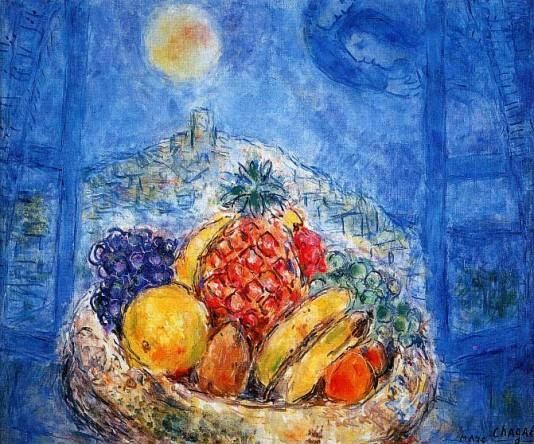Mundane or not, each moment contains everything within it, eternity, and it is a gift of devotion to G-d, like the joyous presentation of first fruits in the Holy Temple. This is romantic idealism to the extreme.
By Rabbi Boruch Merkur

Does the time we spend in the “field” during Elul really prepare us to approach the King’s palace in Tishrei? Is there much to be gained from an entire month of mundanity (“heim yemos ha’chol v’einam yomim tovim”) right before the “high holy days”?
It is fascinating that a week before Rosh HaShana (5752), the Rebbe ascribed profound significance to (even) the most mundane activities. He bestows them with the accolade “bikkurim,” G-d’s first and finest, fit to be presented before G-d in the Beis HaMikdash. There they become “like sanctified items in the Holy Temple” (Seifer HaSichos 5751 Vol. 2, pg. 813, FN 42):
G-d chooses the Jewish people as the bikkurim of the entire world. To reciprocate, “mida k’neged mida,” Jews bring “the first fruits of the earth that G-d has given me – he shall leave it before G-d, your L-rd.” (Ibid pg. 820)
Jews are “bikkurim.” Their purpose is therefore expressed [not only in serving G-d with Torah study and Mitzvos but] in their very existence. Everything else in the world was created for them. Every detail in a Jew’s life (including things that have no overt connection to Torah) – every moment in time, every point in space, every single thought, spoken word, or action – is an end unto itself (and not a means to something else). Every single detail in one’s life introduces something that is entirely new (having inherent purpose). All minutia thus invoke the obligation to say, “For my sake (for the sake of this particular detail of my life experience) the world was created.” That is, all aspects of the world – every moment in time, etc. – are included in a single instance. (Ibid pg. 821)
Mundane or not, each moment contains everything within it, eternity, and it is a gift of devotion to G-d, like the joyous presentation of first fruits in the Holy Temple.
This is romantic idealism to the extreme. You would think that to the extent each moment is precious and eternal, more emphasis should be placed on capitalizing on the opportunity – and not sufficing with the mundane, the Elul, being in the field – not wasting a moment for anything but openly religious activities.
The question strengthens when you delve further into the Rebbe’s incredibly mystical definition of time…
***
How are we to conceive of time? Is the Chassidic understanding of the passage of time and the significance of the present moment consistent with the popular notion of “always already there” – that the now, the journey, the avoda itself contains within it the destination, the future destiny?
The Rebbe describes an even more elegant and sophisticated notion of time – as it pertains to our relationship with Hashem and to the presently unfolding Redemption:
It is possible and thus necessary that from the very beginning of the journey in serving G-d, the avoda of the Jewish people in the world should not reflect the current condition, after the creation of the world and the descent of the soul into the physical realm. Rather, it should express the future state of things, how it will be in the Future Era. (Ibid, pg. 802)
It gets more complex. The Rebbe continues:
The Future Era is akin to the past state of things, prior to Creation (“from the start it was created for this [state of perfection]”*). At the point of origin, prior to descending to the physical realm, the true existence of a Jew is apparent, being one with G-d’s core and essence. At that primordial height, the world also affirms how G-d alone fills the entire space wherein which He created the world. Taking on this mindset makes it easier to complete the intent of Creation in making for G-d a dwelling place in the physical world through “our deeds and service.”
*As stated regarding the beginning of Creation, “The spirit of Elokim hovered upon the face of the water” – this refers to the spirit of Melech HaMoshiach” … (Ibid Footnote 61)
The word “hovered-merachefes” contains the letters Reish-Ches-Fei (Rapach), alluding to the Rapach Nitzutzim d’Tohu, the 288 Sparks of Chaos. The purpose of these sparks of G-dly energy (unveiled in the world through “our deeds and service”) is to reveal “the spirit of Melech HaMoshiach,” which “hovered-merachefes” since the moment of Genesis. (Ibid pg. 804, Footnote 70)
The revelation of “the spirit of Moshiach,” which “hovered-merachefes upon the face of the water” … is especially achieved … through increasing in the study of the inner dimension of the Torah (the Torah of Moshiach) with charifos (with a sharp, keen intellect) – the positive sense of cherfu-scorn [i.e., a reference to “those who scorn Ikvos Meshichecha,” ridiculing the era of the threshold of Redemption, when the “footsteps” of Moshiach can be heard approaching]. (Ibid pg. 807, Footnote 121)
All of this insight indicates the tremendous power of transformation at our fingertips:
A Jew has the power and balebatishkait to bring about a change and innovation in time and space – “Yisroel sanctifies time” [by sanctifying the new moon and thereby establishing the upcoming holidays of the month] – and space (through building shuls and the like). (Ibid pg. 816)
***
Elul is not only the time when we go out to the field to greet the King; the King Himself goes out to greet us and smiles at us, showing us how precious even our mundane activities are to Him. They are received as bikkurim. How much more will we able to recognize in Tishrei the magnificence of the experience, when we are welcomed into the King’s palace and inner chamber to be written and sealed for a good and sweet year with Moshiach now! ■